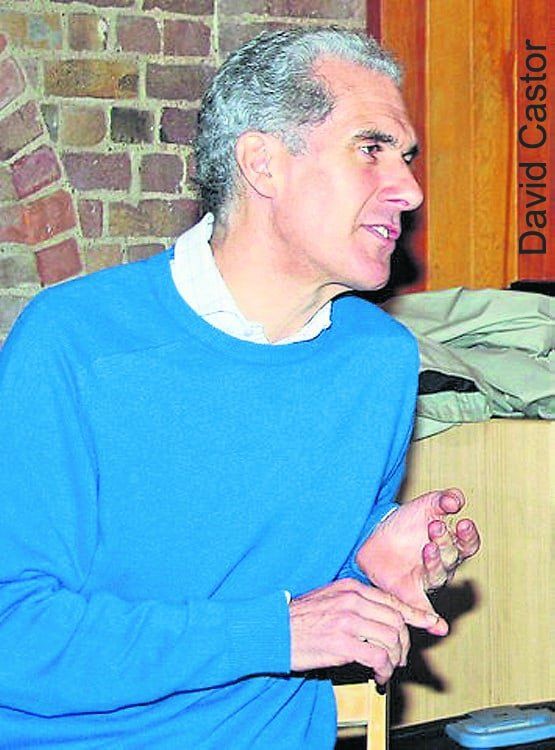
Last month we began to look at the booklet What about other Religions? by Nicky Gumbel. In this booklet he advocates the ‘wider hope theory’, that is, the idea that many who have never heard of Christ may, if they are sincere, still be saved through him.
We continue our analysis by asking what motive exists for evangelising the lost if they do not need to hear the gospel.
Motive
Most ‘wider hope’ theorists recognise that their position on the unreached raises a persistent and nagging question: ‘What possible motive could there be for taking the gospel to someone who does not need to hear it?’ In short — why bother?
Indeed, in addition to motive, what possible justification could there be for exposing people to the risk of rejecting a message they don’t need to hear?
On page 19 of his booklet, Nicky Gumbel suddenly confronts the reader with this ‘catch 22’ caveat. He writes: ‘We have no excuse. No one who has read this chapter will ever be able to say, “I never heard about Jesus”. So also we have no other escape. As the writer of Hebrews warns us all, “How shall we escape if we ignore such great salvation?” (Hebrews 2:3).’
So, according to Gumbel, once a person has been exposed to the gospel their ignorance can no longer excuse them, and their ‘wider hope’ is gone. They now have no excuse and are morally culpable for whatever response they make to the gospel.
On this basis, it would be best to leave people undisturbed, since according to the ‘wider hope’ argument they have an excuse while ignorant of the gospel, but none once they hear it.
Why jeopardise a person’s eternal welfare when we could spare them this risk?
False reasoning
Another argument advanced by proponents of the ‘wider hope’ theory is what is called an ‘argument by analogy’. In a book entitled Many Gods, many Lords, Daniel Clenidin writes about Christians who affirm the eternal security of infants and others who lack the mental capacity to understand the gospel.
He says: ‘Inclusivists simply extend by analogy to these examples [to infer] the salvation of people of other religions’.
Clearly it is tempting to ‘extend by analogy’ from ‘infants who die’ to ‘those of other religions’. But does the analogy stand up? Unfortunately not.

For an analogy to be valid it must compare two things that are in the same logical category. This principle is violated when we compare ‘infants who die’ with ‘adults who have never heard’.
Infants lack the ability to rationally comprehend, but no such inability exists in those who have not heard. Like the supposed biblical evidence for ‘wider hope’, the analogy is illusory.
Absent witnesses
Strangely enough, from the perspective of worldwide evangelisation, we live in a very exciting era of church history. Great advances are being made in the universal proclamation of the gospel, and hitherto un-reached peoples are coming to Christ in large numbers.
Given this global compass of the gospel in today’s world, it seems rather odd that witnesses to the ‘wider hope’ experience remain something of a missing-link. According to the theorists, there ought to be people all over the planet with a particular type of testimony.
Their testimony would surely go something like this: ‘When, belatedly, I heard the gospel of Jesus Christ, I realised that as a Buddhist (or Hindu or Moslem or ….) I had in fact fulfilled all that God required of me and was already saved. It was not actually necessary for me to repent and believe the gospel, because I had already done so without knowing it’.
Who has ever met a person with such a testimony? If the ‘wider hope’ theory were actually true, such experiences should be commonplace, and universally so.
As far as I am aware no such person has ever been found!

What constitutes truth?
‘Wider hope’ advocates get great mileage from the idea that ‘truth’ is found in other religions besides Christianity. Furthermore, there is much in other religions that can be termed ‘good’ .
Now, both these statements are doubtless true, though they need heavy qualification which space does not permit. Commenting on world religions, Nicky Gumbel writes: ‘By putting other religions alongside God’s revelation in Jesus Christ we see that they contain both truth and error’.
This observation, though, is not particularly instructive, since the central issues at stake are ‘saving faith’ and ‘justifying righteousness’. According to God’s Word, it is precisely these things that we will never find in the natural religious man.
No one is denying that God is at work in the world through common grace, and that this results in much ‘goodness’ by human standards. Nor do we deny that mankind has religious awareness, by virtue of bearing God’s image.
The problem arises when an attempt is made to interpret these spiritual intimations as a saving experience, thereby populating the world with people who are, at one and the same time, allegedly saved but not converted!
Biblical testimony
It may be worth returning now to the recurring statement that the Bible is silent on all those matters of which ‘wider hope’ advocates are convinced. In stating that Jesus is the only ground of salvation, Nicky Gumbel asks himself about the fate of those outside of Christ.

He responds: ‘The Bible is a practical book, not a philosophical one. It does not answer hypothetical questions directly. This question can only ever be hypothetical since it can only be asked by someone who has heard about Jesus’.
But let us examine his statement closely. First, the Bible contains a great deal of philosophy, as any Christian library will testify.
Secondly, the spiritual standing of those outside of Christ is nowhere viewed as hypothetical but is made explicit everywhere in the New Testament. It is this that provides both the impulse for and raison d’être for world mission.
Without hope
Consider what Paul wrote to Gentile converts who had turned to Christ during his third missionary journey. Describing exactly how they stood in relation to God prior to their exposure to the gospel, he says:
‘Remember that at that time you were separate from Christ, excluded from citizenship in Israel and foreigners to the covenants of promise, without hope and without God in the world’ (Ephesians 2:12).
Was Paul in error when he described them as being ‘without hope’ and ‘without God’? To suggest that the Bible is silent on such issues would require us to dispense with God’s Word rather than submit to it.
Certainly as ‘wider hope’ apologists often point out, we must give due weight to Abraham’s rhetorical question: ‘Will not the judge of all the earth do right?’ (Genesis 18:25).
But it was this very expectation that injected a sense of urgency and finality into the Great Commission for a previous generation.
Global warning
The Great Commission mandate is under attack throughout the western church. This attack comes from a whole host of alien ideas which, though foreign to the Bible, are regarded as politically correct in our post-modern culture.
These ideas include religious pluralism, ‘wider hope’, and post-mortem evangelism, to name but a few.

Paradoxically this situation has arisen at a time when missiologists have identified the last remaining people-groups to be reached, and the languages into which the Bible must yet be translated.
Does it not seem strange that at such a time as this we are being encouraged to divest the Great Commission mandate of its urgency and finality?
The way forward
In the light of all this, what response is appropriate to the need of the day? I suggest two things.
Firstly, we need a new generation of missionary apologists. Most missionary agencies can no longer operate on the assumption that the convictions which brought them into being are still alive within the church.
It is not enough just to present the Great Commission — its very raison d’être must be fought for. This reality has been forced upon us and we must not retreat from the challenge and conflict it brings.
Secondly, contemporary confessions of faith seem called for. The time is ripe for Evangelical missionary agencies to articulate in contemporary language a range of confessional responses to pluralism and ‘wider hope’ theories.
Powerful confessions are inspirational, and can serve to galvanise the church into action. It is often forgotten that powerful public declarations often accompanied the beginnings of modern missions.
These simple but profound statements employed doctrinal assertions, declarations of intent, and even statistics concerning the unevangelised multitudes.
Finally, a new generation of confessional statements would allow the Christian public to determine whether their practical and spiritual support is still going to missionary agencies that are faithful to the Great Commission.






